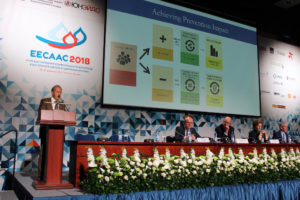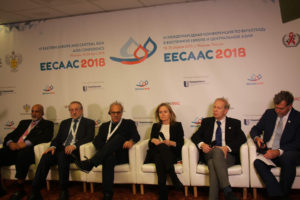
Author: Marina Maximova, Kazakhstan
While the VI Eastern Europe and Central Asia AIDS Conference (EECAAC 2018) was going on in Moscow, Svetlana (the name was changed), a 28-year-old woman living in Karaganda, Kazakhstan became a mother for the first time. It seems that these events are not related at all. However, these two facts were brought together not accidentally. At the international forum, scientists, medical professionals, policy-makers, public officials, international experts and civil society activists argued and discussed how to curb the HIV epidemic and achieve the ambitious 90-90-90 UNAIDS targets. Meanwhile, they were not particularly optimistic. At the same time, a woman living with HIV for eight years gave birth to healthy twins. Maybe it is a sign that we should not give up hope?
Optimists and pessimists together
The question of HIV vaccine has become proverbial. For many years, the best scientific minds of the world have been struggling to invent it. There is no consensus among scientists about the feasibility of a panacea for HIV – the discovery of a vaccine.
Vadim Pokrovskiy, Head of the Russian Federal AIDS Centre honestly says that he is pessimistic about it.
“Personally, I think that it is not possible. There are infectious diseases, to which people naturally become immune after they recover from them. HIV is more like malaria, which does not belong to this category. However, I would be very happy to see such vaccine discovered,” says Dr. Pokrovskiy.
Salim Abdool Karim, Director of the Centre for the AIDS Programme of Research in South Africa (CAPRISA), vice versa, says that he has never been as optimistic about the HIV vaccine as today.
“A study on the production of HIV antibodies is already in progress. In South Africa, there is a woman, whose antibodies kill about 87% of all known modifications of the virus. We take her antibodies and test their efficiency in HIV prevention,” tells the scientist.
This positive attitude is also shared by Peter Reiss, Local Co-Chair of the 22nd International AIDS Conference (AIDS 2018), Professor of Medicine at the Academic Medical Centre (AMC) in Amsterdam, the Netherlands. He points out that HIV vaccine trials successfully started in Thailand several years ago. Currently, research is going on and the preliminary data are promising. However, this work takes a long time.
Prolonged ART gives a hope for tomorrow

At EECAAC 2018, the leading world scientists shared information about the development of two ARV drugs with prolonged effect. It means that people living with HIV will be able to substitute daily pills with periodic injections. It is much more convenient. Currently, two major research studies of prolonged-action drugs are going on in South Africa.
Stefano Vella, Head of the Department of Therapeutic Research and Medicines Evaluation at the Italian National Institute of Health says that the studies of prolonged-action drugs are currently underway.
“It is not just about injections, but also about implants. For instance, like female contraceptives. It is important that there should be an option to remove them in case of side effects. Every patient should have a choice which medicines to use and the patient’s preferences should be taken into account,” he says.
There is no doubt that the right to choose has an impact on adherence to treatment. For those who have problems with adherence, the ability to take drugs not in the form of pills and without the need of daily administration may be the key to undetectable viral load and better quality of life.
Just a story
Svetlana from Karaganda learned about her positive HIV status when she was 20. The woman did not have a vaccine. For a long time, she could not accept her diagnosis. She even had suicidal thoughts. Svetlana had no idea how to go on living her life. However, she met a man, fell in love with him and they got married. ARV medicine helped her to give birth to healthy children. The happy mother with her babies has already been released from the maternity clinic. The twins have a good appetite; they are quickly gaining weight. This is the main cause of optimism for the woman.
According to the statistics since the 1990s, only in Karaganda region mothers living with HIV gave birth to more than 400 babies. Last year, 36 babies were born. They all remain under follow-up care until they turn 18 months old.




